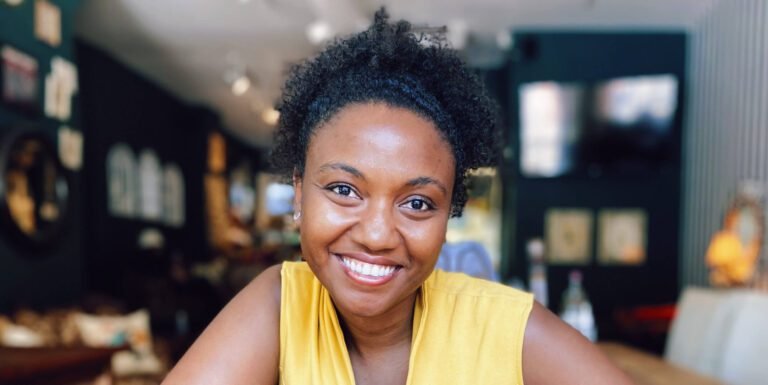
Jet Stamps
JetteStubbs.com
What was your dream career as a child?
As a child, my dream career was to be a traveling entrepreneur with an artistic hobby. I didn’t have many opportunities to travel as a child, growing up on a small island in the Bahamas where tourism was the main industry. I was always fascinated by the tourists I saw and wanted to visit the places they came from. Additionally, I had a passion for design and envisioned holding art exhibitions and having an art and woodworking studio at home.
Describe the moment you decided to become an entrepreneur.
First, I decided I wanted to be an entrepreneur. At 21, I was an international student with 90 days to build a career or business or leave the country. I knew I wanted to be an entrepreneur. I scoured the job descriptions but couldn’t find anything I liked. For entrepreneurship, I faced the challenge of not knowing what to sell, where to start, and how to gain people’s trust in my offerings. I also needed immediate financial stability.
Despite applying to over 100 jobs and getting no response, I discovered how to sell myself effectively. This resulted in 7 responses out of 10 job applications. I started helping other people learn how to sell themselves and get higher paying jobs, usually with salary increases of $20,000 or more.
Then, I decided to become an entrepreneur. After 6 years of working and helping other people get jobs on the side, my father was diagnosed with dementia and my brother and I moved countries to come home to care for him. Then, I realize that making money can’t stop when life goes wrong and I need to build a career with more flexibility. This led me to move into full-time career coaching and later career coaching.
What drives the work you do?
Customer transformations. I help people restructure the way they work so they plan their work and income to match their life goals. Planning your work is about planning how you finance your life and the time and energy you have to spend with family and loved ones. Here are three examples:
Brittany — Brittany quit working at a family daycare and built her dream career by posting 50 clients in her first 18 months. He helps marginalized non-fiction writers go from a simple idea to a compelling book with solid sales. She moved countries with her partner and distanced herself from stressful relationships.
Mo — After helping Mo increase his salary by 39 percent, he was able to buy a car and pay for a mortgage so he could move his parents from Palestine. His father was a political prisoner.
I recently had a client who went from a $70,000 to $210,000 salary with a bonus – it made a huge difference in her life.
My favorite part is when clients discover career paths they didn’t know existed before.
What is the most exciting thing you are working on in your business right now?
I recently implemented a 4X ROI or your Money Back Guarantee. My clients make a 4x return on their investment after working with me or their money back. I also became certified in Trauma of Money, which helps clear up the fears and anxieties we have as we approach earning, using and keeping money.
What does entrepreneurship mean to you?
Financial and lifestyle freedom, as well as serving others.
My favorite part is when clients discover career paths they didn’t know existed before.
What drew you to SPI Pro?
I have been following Pat for about a decade. When SPI Pro was released, I had some serious doubts and impostor syndrome about joining. I wasn’t sure if I was far enough along in my business development to be with other entrepreneurs, but I always found Pat’s approach to entrepreneurship grounded, honest and welcoming.
In addition, I had gone through the phase of trying to convince my friends, even business people, to become “business guys”. I quickly realized, instead of looking within my community, I needed to expand my community to include entrepreneurs who were actively seeking out the community.
SPI Pro offered a community around entrepreneurship and business development. In the last two years, it has only improved by providing access to all of Pat’s online courses.
What is the most powerful moment of interaction or learning you’ve had in the community?
The riches are in the SPI Pro community posts. My strongest interactions are definitely inside brains! SPI went to great lengths to bring the right people together so I could build community around business development.
When I joined SPI Pro, I tried to join masterminds led by other members and couldn’t find exactly what I was looking for. I thought about leaving the community, but then I decided to lead with my brain. I put together a brainstorming request that specifically describes the small community I’d like to have and the support I’d like. This mastermind has been running for almost a year now and we have all said that we are grateful and excited by the knowledge, value and support brought to the table.
I am surrounded by so many different skill sets — lawyers, accountants, entrepreneurs, therapists, nutritionists, doctors. Since joining and running masterminds, I’ve launched a podcast, 3x my prices, been a guest podcast for an SPI member with over 60,000 downloads a month, and just felt supported. Now with access to SPI Academy, SPI Pro is simply an unbeatable value.
My brain gives me accountability and perspective when I’m feeling stressed or questioning my next steps in business development.
What role has SPI Pro played in your business?
It gave me an online community and expanded my knowledge base, network and tools. My brain gives me accountability and perspective when I’m feeling stressed or questioning my next steps in business development.
I started a podcast and used it as part of my generation to generate 10,000 sales from it and host podcasts in the first few months.
What do you like most about SPI Pro and what sets SPI communities apart from other business communities?
Feels like a wrap brace. If you want community and accountability, create or join a mastermind. If you have specific questions about a topic, forums are a place to get answers from people with different skill sets. If you want to learn about a skill, use all the courses in SPI Academy. There are so many online resources that teach you one thing, but SPI helps you unlock what feels like a small MBA that focuses on community entrepreneurship.
How about encouraging non-community entrepreneurs to join a community?
You grow faster when you’re not alone, plus the journey is less lonely. I’ve heard so many people talk about turning to their spouses, partners or work friends to talk about all their business goals and obstacles. It’s nice to be able to talk to someone who has been through it or is going through it, especially when you’re in an online group of people who are actively looking for a community to talk these things out.
If you had to start a brand new online business from scratch today, what would it be?
Career coaching. For me, I find it easy to convince people to find work that aligns with who they are, and I’ve done it on 4 continents in over 40 industries. Business coaching takes a little more time to reach and build a clientele. I don’t know if that would count as “from scratch”. If not, then my second choice is a marketing agency. I enjoy working with marketing processes and writing sales copy.
If you had to start your own drift business all over again today, what would you do differently?
I would focus on testing and acting in community, rather than learning in solitude. I would look for community instead of listening to endless tutorials, podcasts, YouTube. Then create sales channels and invest in marketing earlier. I would have accessed therapy sooner to support my shift in how I view the value of my work and money so I wouldn’t let impostor syndrome hold me back so much.
My community will consist of other entrepreneurs looking for community and accountability, class/course instructors, and therapy for therapy. It would be radically different and cheaper in the long run than a do-it-yourself approach.
If you were given $1 million today, with no strings attached, what would you do with it?
I would invest in new businesses and projects with passion. I would invest in increments of $100,000 – $250,000 in new business ideas, allowing the rest of the money to sit. I would focus on marketing and testing ideas first. There are a lot of cool projects that focus on social impact and social entrepreneurship that I would be involved with.

